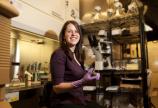A Nobel-filled year for biochemistry grad
- Valerie Shore

How many people can say they’ve rubbed shoulders with 37 Nobel laureates? For Michelle (Tonkin) Parker that amazing experience capped a remarkable academic career at UVic that culminates this month with a PhD in biochemistry.
This June, Parker had the privilege of joining 600 aspiring young researchers from almost 80 countries taking part in the 2014 Lindau Nobel Laureate Meeting on Physiology and Medicine in Germany.
She and the other students—mainly master’s and PhD students—attended lectures, panel discussions and master classes with 37 Nobel laureates at the meeting, which is intended to promote dialogue among generations, cultures and nations.
“It was an exceptional opportunity to meet the founders of modern science and top young scientists from around the world,” says Parker, whose favourite lecture was by 89-year-old geneticist Oliver Smithies, co-winner of the 2007 Nobel Prize in Physiology or Medicine.
“He used his life experiences to discuss how the ordinary and extraordinary pieces of our lives intertwine with our scientific education and result in the evolution of ideas,” she says.
Parker was selected for Lindau by the Canadian Student Health Research Forum after winning one of 10 Gold Awards of Excellence at a poster competition for the top five per cent of health research graduate students across Canada.
Of the 10 poster topics, judges deemed Parker’s to have “the greatest novelty and potential,” and awarded her one of three Canadian nominations to attend the 2014 Lindau Meeting.
Parker’s PhD research focuses on the strategy used by a group of parasites (the “apicomplexans”)—including those that cause malaria and toxoplasmosis—to invade host cells and cause disease. “We see this invasion strategy as an ‘Achilles heel’ for therapeutic intervention,” she says. “One of our major goals is to support the development of more effective drugs and vaccines.”
Parker has already published 16 papers in peer-reviewed journals, including Science, one of the world’s leading research journals. Her paper—the result of collaboration with French scientists—was chosen as the top biochemistry paper in that issue and has been cited more than 70 times since its publication in 2011.
Parker says her most memorable personal experience at Lindau was with Francoise Barre-Sinoussi, who shared the 2008 Nobel with her mentor for their joint discovery of HIV.
“I chose to sit with her at dinner one evening based on our common interest in the study of pathogens,” says Parker. “We had a memorable conversation that touched on a variety of topics from general life as a scientist, to her experience of winning the Nobel, to the excitement of scientific discovery.
“Getting to know the personalities behind some of the most significant contributions to modern science was unforgettable,” she adds.
Parker plans to stay on in the UVic lab for another year to continue her investigations into pathogens and host cells while her new husband Matthew finishes his PhD in biochemistry. Then she’ll likely pursue postdoctoral studies in academia or industry. “My main career goal is to be involved in fascinating science that has a clear path to beneficially impact the lives of others.”

